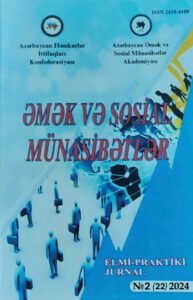№ 2 (22) 2024
The main press body of the Azerbaijan Academy of Labor and Social Relations is the scientific-practical magazine “Labor and Social Relations”. The magazine is published twice a year in the volume of 8-10 printed sheets, with a circulation of 200. Today, at a time when scientific journals are in the majority, the articles presented in the “Labor and social relations” scientific-practical journal show a high scientific level, training and strengthening of intellectual potential, improving the quality of education, contributing to the study of social labor relations problems, information technologies to apply the successes achieved in the field in recent years in international scientific cooperation, etc. such important tasks.
Scientific-practical magazine “Labor and social relations” is always open for intellectual discussions and exchange of ideas on scientific issues. Journal of social problems and economy of modern science, sociology, law, etc. It is a real discussion area of current issues related to development.

About article
VALUES OF MODERN AZERBAIJANI YOUTH TRANSFORMATION OF ORIENTATION
Rafail Hasanov
BDU Sosiologiya kafedrasının müdiri, professor, sos.e.d., Azərbaycan has_rm62@yahoo.com
ABSTRACT
Values are a set of concepts, and ideas existing in society about what is good and acceptable and what is bad and unacceptable. Values can be individual, group, intergroup, public and intersocietal, civilizational, and universal. Values vary spatially, temporally, and historically. Values change, being open and latent, with the first occurring in a formal (state) manner, and the second in an informal (latent) manner.
Traditional values constitute the fundamental values of a society. Traditional values operate at the micro and macro levels. In the second half of the 20th century, world society began to enter a new stage of social development, which manifested itself in the formation of a post-industrial society. Consumerism and the sexual revolution have become one of the defining sociocultural trends of post-industrial society. In post-industrial society, the role of the media has increased from the point of view of creating and forming a hierarchy of value systems. The ongoing transformation processes in society are especially acutely reflected in the younger generation, who are diligently searching for a way to build a life in conditions of increasing uncertainty.
Methodology: Systematic approach, analysis of documents (laws), and research of changes in the life and value system of young people using methods of secondary analysis, identifying opportunities for obtaining new knowledge.
Scientific novelty: Events taking place in the spiritual, moral, and sociocultural space of society indicate that traditional values, which have long been an integral part of the life and development of people, have not received significance in society. Values stand guard over culture, and a society that loses its values inevitably disappears from the stage of history. Understanding the sociocultural changes taking place in the world today, we can conclude that we live in a time when there are no values. The modern world is increasingly plunging into the abyss of planned chaos, postmodern absurdity, and the global collapse of the traditional sociocultural structure of civilization. The ideals and worldviews of the modern young generation are largely shaped by the influence of the Internet, especially social networks. Therefore, it seems appropriate to study the information field as part of the general sociocultural space in which the current generation of youth, conventionally defined as Y and Z, operates and communicates.
Keywords: traditional values, post-industrial values, post-industrial society, consumerism, Internet